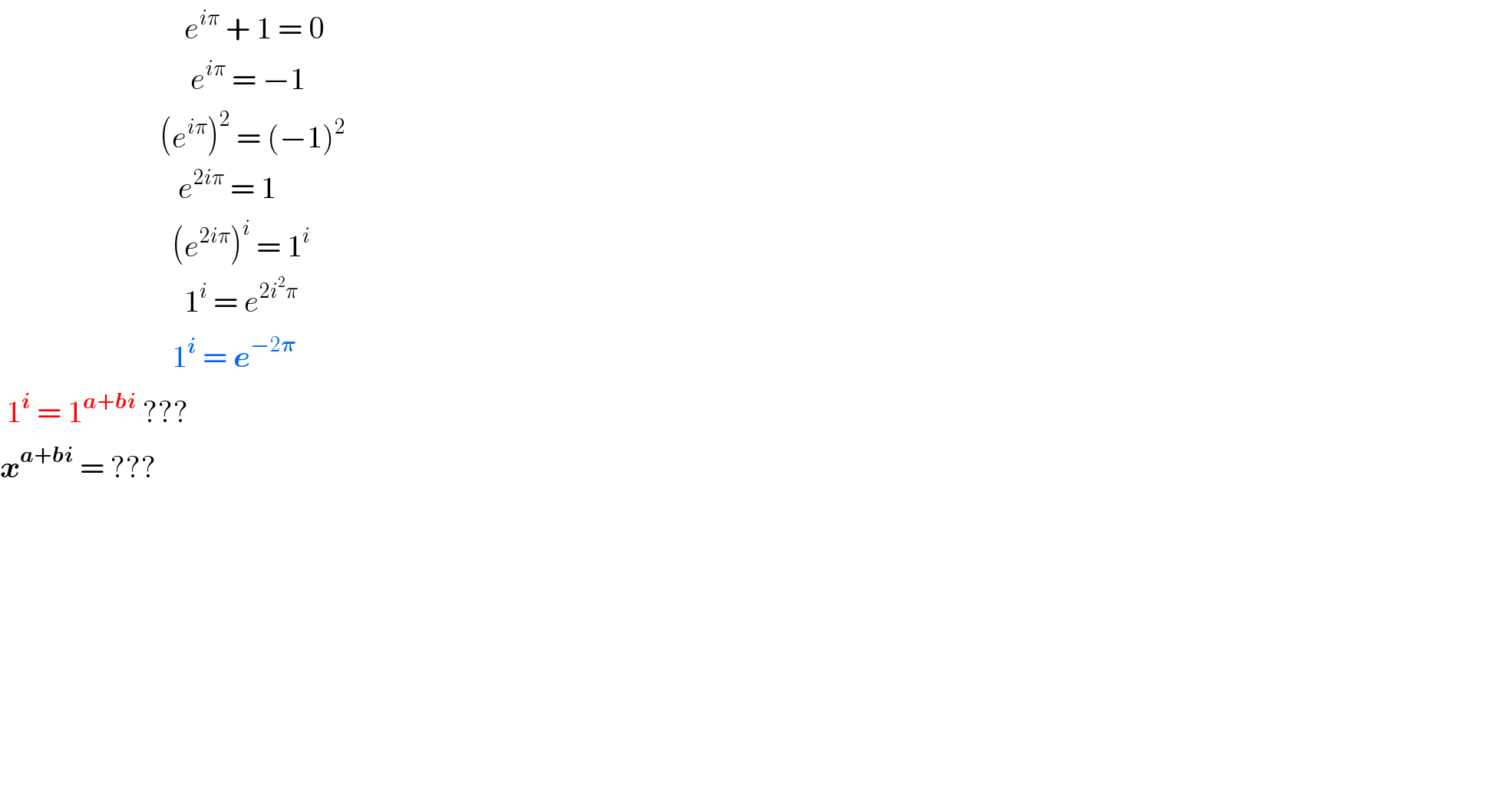Question Number 9255 by geovane10math last updated on 26/Nov/16

$$\:\:\:\:\:\:\:\:\:\:\:\:\:\:\:\:\:\:\:\:\:\:\:\:\:\:\:\:\:\:{e}^{{i}\pi} \:+\:\mathrm{1}\:=\:\mathrm{0} \\ $$$$\:\:\:\:\:\:\:\:\:\:\:\:\:\:\:\:\:\:\:\:\:\:\:\:\:\:\:\:\:\:\:{e}^{{i}\pi} \:=\:−\mathrm{1} \\ $$$$\:\:\:\:\:\:\:\:\:\:\:\:\:\:\:\:\:\:\:\:\:\:\:\:\:\:\left({e}^{{i}\pi} \right)^{\mathrm{2}} \:=\:\left(−\mathrm{1}\right)^{\mathrm{2}} \\ $$$$\:\:\:\:\:\:\:\:\:\:\:\:\:\:\:\:\:\:\:\:\:\:\:\:\:\:\:\:\:{e}^{\mathrm{2}{i}\pi} \:=\:\mathrm{1} \\ $$$$\:\:\:\:\:\:\:\:\:\:\:\:\:\:\:\:\:\:\:\:\:\:\:\:\:\:\:\:\left({e}^{\mathrm{2}{i}\pi} \right)^{{i}} \:=\:\mathrm{1}^{{i}} \\ $$$$\:\:\:\:\:\:\:\:\:\:\:\:\:\:\:\:\:\:\:\:\:\:\:\:\:\:\:\:\:\:\mathrm{1}^{{i}} \:=\:{e}^{\mathrm{2}{i}^{\mathrm{2}} \pi} \\ $$$$\:\:\:\:\:\:\:\:\:\:\:\:\:\:\:\:\:\:\:\:\:\:\:\:\:\:\:\:\mathrm{1}^{\boldsymbol{{i}}} \:=\:\boldsymbol{{e}}^{−\mathrm{2}\boldsymbol{\pi}} \\ $$$$\:\mathrm{1}^{\boldsymbol{{i}}} \:=\:\mathrm{1}^{\boldsymbol{{a}}+\boldsymbol{{bi}}} \:??? \\ $$$$\boldsymbol{{x}}^{\boldsymbol{{a}}+\boldsymbol{{bi}}} \:=\:??? \\ $$$$ \\ $$$$\:\:\:\:\: \\ $$$$ \\ $$$$ \\ $$$$ \\ $$$$ \\ $$$$ \\ $$
Commented by RasheedSoomro last updated on 26/Nov/16

$$“\mathrm{Squaring}\:\mathrm{both}\:\mathrm{sides}''\:\mathrm{may}\:\mathrm{not}\:\mathrm{yield}\:\mathrm{equivalent} \\ $$$$\mathrm{statement}. \\ $$
Commented by FilupSmith last updated on 27/Nov/16

$${e}^{\mathrm{2}{i}\pi} \:=\mathrm{1} \\ $$$${e}^{\mathrm{2}{i}\pi} =\mathrm{cos}\left(\mathrm{2}\pi\right)+{i}\mathrm{sin}\left(\mathrm{2}\pi\right) \\ $$$$=\mathrm{1}+{i}\left(\mathrm{0}\right)=\mathrm{1} \\ $$
